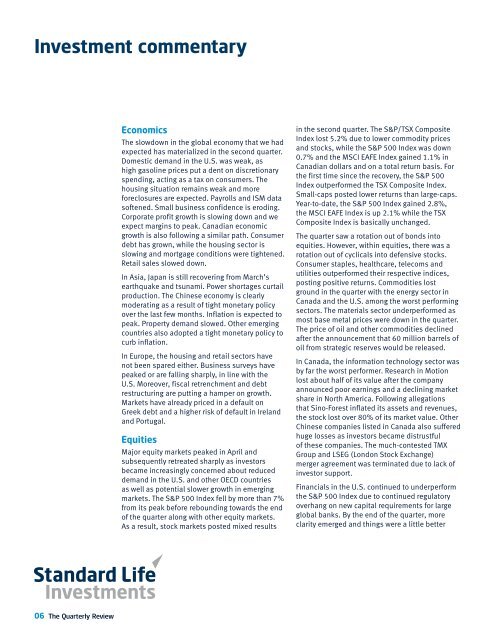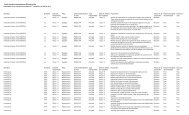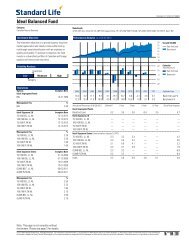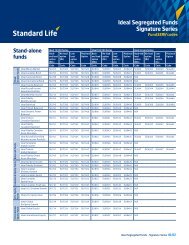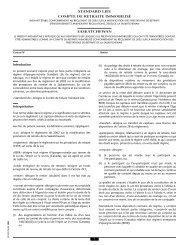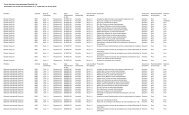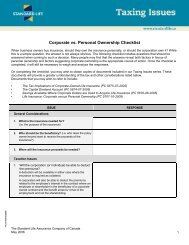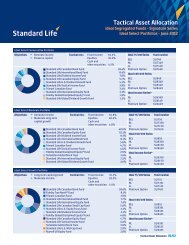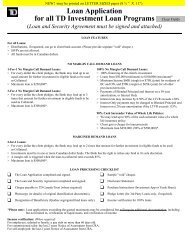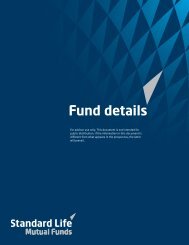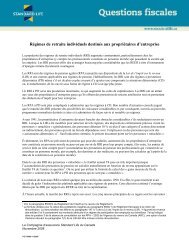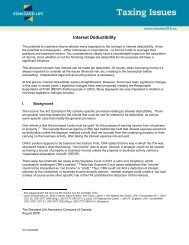Standard Life Canadian Equity Class
Standard Life Canadian Equity Class
Standard Life Canadian Equity Class
You also want an ePaper? Increase the reach of your titles
YUMPU automatically turns print PDFs into web optimized ePapers that Google loves.
Investment commentary<br />
06 The Quarterly Review<br />
Economics<br />
The slowdown in the global economy that we had<br />
expected has materialized in the second quarter.<br />
Domestic demand in the U.S. was weak, as<br />
high gasoline prices put a dent on discretionary<br />
spending, acting as a tax on consumers. The<br />
housing situation remains weak and more<br />
foreclosures are expected. Payrolls and ISM data<br />
softened. Small business confidence is eroding.<br />
Corporate profit growth is slowing down and we<br />
expect margins to peak. <strong>Canadian</strong> economic<br />
growth is also following a similar path. Consumer<br />
debt has grown, while the housing sector is<br />
slowing and mortgage conditions were tightened.<br />
Retail sales slowed down.<br />
In Asia, Japan is still recovering from March’s<br />
earthquake and tsunami. Power shortages curtail<br />
production. The Chinese economy is clearly<br />
moderating as a result of tight monetary policy<br />
over the last few months. Inflation is expected to<br />
peak. Property demand slowed. Other emerging<br />
countries also adopted a tight monetary policy to<br />
curb inflation.<br />
In Europe, the housing and retail sectors have<br />
not been spared either. Business surveys have<br />
peaked or are falling sharply, in line with the<br />
U.S. Moreover, fiscal retrenchment and debt<br />
restructuring are putting a hamper on growth.<br />
Markets have already priced in a default on<br />
Greek debt and a higher risk of default in Ireland<br />
and Portugal.<br />
Equities<br />
Major equity markets peaked in April and<br />
subsequently retreated sharply as investors<br />
became increasingly concerned about reduced<br />
demand in the U.S. and other OECD countries<br />
as well as potential slower growth in emerging<br />
markets. The S&P 500 Index fell by more than 7%<br />
from its peak before rebounding towards the end<br />
of the quarter along with other equity markets.<br />
As a result, stock markets posted mixed results<br />
in the second quarter. The S&P/TSX Composite<br />
Index lost 5.2% due to lower commodity prices<br />
and stocks, while the S&P 500 Index was down<br />
0.7% and the MSCI EAFE Index gained 1.1% in<br />
<strong>Canadian</strong> dollars and on a total return basis. For<br />
the first time since the recovery, the S&P 500<br />
Index outperformed the TSX Composite Index.<br />
Small-caps posted lower returns than large-caps.<br />
Year-to-date, the S&P 500 Index gained 2.8%,<br />
the MSCI EAFE Index is up 2.1% while the TSX<br />
Composite Index is basically unchanged.<br />
The quarter saw a rotation out of bonds into<br />
equities. However, within equities, there was a<br />
rotation out of cyclicals into defensive stocks.<br />
Consumer staples, healthcare, telecoms and<br />
utilities outperformed their respective indices,<br />
posting positive returns. Commodities lost<br />
ground in the quarter with the energy sector in<br />
Canada and the U.S. among the worst performing<br />
sectors. The materials sector underperformed as<br />
most base metal prices were down in the quarter.<br />
The price of oil and other commodities declined<br />
after the announcement that 60 million barrels of<br />
oil from strategic reserves would be released.<br />
In Canada, the information technology sector was<br />
by far the worst performer. Research in Motion<br />
lost about half of its value after the company<br />
announced poor earnings and a declining market<br />
share in North America. Following allegations<br />
that Sino-Forest inflated its assets and revenues,<br />
the stock lost over 80% of its market value. Other<br />
Chinese companies listed in Canada also suffered<br />
huge losses as investors became distrustful<br />
of these companies. The much-contested TMX<br />
Group and LSEG (London Stock Exchange)<br />
merger agreement was terminated due to lack of<br />
investor support.<br />
Financials in the U.S. continued to underperform<br />
the S&P 500 Index due to continued regulatory<br />
overhang on new capital requirements for large<br />
global banks. By the end of the quarter, more<br />
clarity emerged and things were a little better


